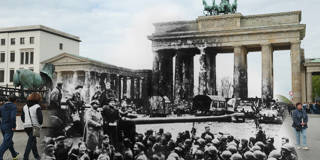On the 75th anniversary of the end of World War II, Germans' relationship with their own history remains as complicated as ever. Coming to terms with the Nazi era has been a multi-generational effort, and it is one that will never end.
BERLIN – Slightly more than two million of Germany’s 83 million people are over the age of 85, and can therefore be expected to have witnessed at least some of the horrors of National Socialism and World War II. On the 75th anniversary of the end of the war, the question thoughtful Germans ask is what will happen when these last witnesses to the Nazi era – the most barbaric 12 years in human history – are gone forever.
To be sure, this question is not new. Back in the 1970s, Herbert Wehner, the longstanding Social Democratic Party whip and himself a refugee, delivered passionate speeches in the German parliament warning that, with the passing of those who remembered the slide into Adolf Hitler’s dictatorship and the price paid for it, the defense of democracy would become more difficult.
Such concerns have grown more pronounced with each generation. In the absence of direct historical memory, Samuel Salzborn of the University of Giessen worries that the notion of collective responsibility might once again give way to willful ignorance and “collective innocence.”

BERLIN – Slightly more than two million of Germany’s 83 million people are over the age of 85, and can therefore be expected to have witnessed at least some of the horrors of National Socialism and World War II. On the 75th anniversary of the end of the war, the question thoughtful Germans ask is what will happen when these last witnesses to the Nazi era – the most barbaric 12 years in human history – are gone forever.
To be sure, this question is not new. Back in the 1970s, Herbert Wehner, the longstanding Social Democratic Party whip and himself a refugee, delivered passionate speeches in the German parliament warning that, with the passing of those who remembered the slide into Adolf Hitler’s dictatorship and the price paid for it, the defense of democracy would become more difficult.
Such concerns have grown more pronounced with each generation. In the absence of direct historical memory, Samuel Salzborn of the University of Giessen worries that the notion of collective responsibility might once again give way to willful ignorance and “collective innocence.”